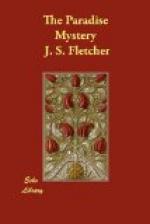“What have they found out?” asked Mary quietly.
“That I’m not at liberty to tell,” replied Bryce. “But I can tell you this—they know, Mitchington and the London man, that there were passages between Ransford and Braden years ago.”
“How many years ago?” interrupted Mary.
Bryce hesitated a moment. He had a suspicion that this self-possessed young woman who was taking everything more quietly than he had anticipated, might possibly know more than he gave her credit for knowing. He had been watching her fingers since they sat down in the summer-house, and his sharp eyes saw that they were as steady as the spire of the cathedral above the trees—he knew from that that she was neither frightened nor anxious.
“Oh, well—seventeen to twenty years ago,” he answered. “About that time. There were passages, I say, and they were of a nature which suggests that the re-appearance of Braden on Ransford’s present stage of life would be, extremely unpleasant and unwelcome to Ransford.”
“Vague!” murmured Mary. “Extremely vague!”
“But quite enough,” retorted Bryce, “to give the police the suggestion of motive. I tell you the police know quite enough to know that Braden was, of all men in the world, the last man Ransford desired to see cross his path again. And—on that morning on which the Paradise affair occurred—Braden did cross his path. Therefore, in the conventional police way of thinking and looking at things, there’s motive.”
“Motive for what?” asked Mary.
Bryce arrived here at one of his critical stages, and he paused a moment in order to choose his words.
“Don’t get any false ideas or impressions,” he said at last. “I’m not accusing Ransford of anything. I’m only telling you what I know the police think and are on the very edge of accusing him of. To put it plainly—of murder. They say he’d a motive for murdering Braden—and with them motive is everything. It’s the first thing they seem to think of; they first question they ask themselves. ’Why should this man have murdered that man?’—do you see! ’What motive had he?—that’s the point. And they think—these chaps like Mitchington and the London man—that Ransford certainly had a motive for getting rid of Braden when they met.”
“What was the motive?” asked Mary.
“They’ve found out something—perhaps a good deal—about what happened between Braden and Ransford some years ago,” replied Bryce. “And their theory is—if you want to know the truth —that Ransford ran away with Braden’s wife, and that Braden had been looking for him ever since.”
Bryce had kept his eyes on Mary’s hands, and now at last he saw the girl’s fingers tremble. But her voice was steady enough when she spoke.
“Is that mere conjecture on their part, or is it based on any fact?” she asked.




